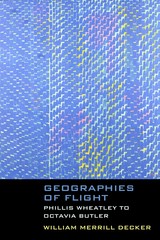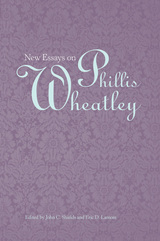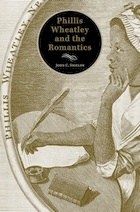
African American writing commonly represents New World topography as a set of entrapments, contesting the open horizons, westward expansion, and individual freedom characteristic of the white, Eurocentric literary tradition. Geographies of Flight: Phillis Wheatley to Octavia Butler provides the first comprehensive treatment of the ways in which African American authors across three centuries have confronted the predicament of inhabiting space under conditions of bondage and structural oppression. William Merrill Decker examines how, in testifying to those conditions, fourteen black authors have sought to transform a national cartography that, well into the twenty-first century, reflects white supremacist assumptions. These writers question the spatial dimensions of a mythic American liberty and develop countergeographies in which descendants of the African diaspora lay claim to the America they have materially and culturally created.
Tracking the testimonial voice in a range of literary genres, Geographies of Flight explores themes of placement and mobility in the work of Phillis Wheatley, Olaudah Equiano, David Walker, Frederick Douglass, Harriet Jacobs, Booker T. Washington, Ida B. Wells-Barnett, W. E. B. Du Bois, Richard Wright, Ralph Ellison, Malcolm X, James Baldwin, Toni Morrison, and Octavia Butler.

The first African American to publish a book on any subject, poet Phillis Wheatley (1753?–1784) has long been denigrated by literary critics who refused to believe that a black woman could produce such dense, intellectual work, let alone influence Romantic-period giants like Samuel Taylor Coleridge. Indeed, Thomas Jefferson once declared that “the compositions published under her name are below dignity of criticism.” In recent decades, however, Wheatley’s work has come under new scrutiny as the literature of the eighteenth century and the impact of African American literature have been reconceived. In these never-before-published essays, fourteen prominent Wheatley scholars consider her work from a variety of angles, affirming her rise into the first rank of American writers.
The pieces in the first section show that perhaps the most substantial measure of Wheatley’s multilayered texts resides in her deft handling of classical materials. The contributors consider Wheatley’s references to Virgil’s Aeneid and Georgics and to the feminine figure Dido as well as her subversive critique of white readers attracted to her adaptation of familiar classics. They also discuss Wheatley’s use of the Homeric Trojan horse and eighteenth-century verse to mask her ambitions for freedom and her treatment of the classics as political tools.
Engaging Wheatley’s multilayered texts with innovative approaches, the essays in the second section recontextualize her rich manuscripts and demonstrate how her late-eighteenth-century works remain both current and timeless. They ponder Wheatley’s verse within the framework of queer theory, the concepts of political theorist Hannah Arendt, rhetoric, African studies, eighteenth-century “salon culture,” and the theoretics of imagination.
Together, these essays reveal the depth of Phillis Wheatley’s literary achievement and present concrete evidence that her extant oeuvre merits still further scrutiny.
John C. Shields is Distinguished Professor of English at Illinois State University. He is the editor of The Collected Works of Phillis Wheatley and author of The American Aeneas: Classical Origins of the American Self, a Choice Outstanding Academic Book; Phillis Wheatley and the Romantics; and Phillis Wheatley’s Poetics of Liberation; and awarded honorable mention in competition for the American Comparative Literature Association’s Harry Levin Prize. As well, Shields serves as director of the Center for Classicism and American Culture and General Editor for the series of monographs on Classicism in American Culture to be published by the University of Tennessee Press.
Eric D. Lamore is an assistant professor of English at the University of Puerto Rico, Mayaguez, and a contributor to The Greenwood Encyclopedia of American Poets and Poetry.

Phillis Wheatley was the first African American to publish a book. Born in Gambia in 1753, she came to America aboard a slave ship, the Phillis. From an early age, Wheatley exhibited a profound gift for verse, publishing her first poem in 1767. Her tribute to a famed pastor, “On the Death of the Rev. Mr. George Whitefield,” followed in 1770, catapulting her into the international spotlight, and publication of her 1773 Poems on Various Subjects Religious and Moral in London created her an international star.
Despite the attention she received at the time, history has not been kind to Wheatley. Her work has long been neglected or denigrated by literary critics and historians. John C. Shields, a scholar of early American literature, has tried to help change this perception, and Wheatley has begun to take her place among the elite of American writers.
In Phillis Wheatley and the Romantic Age, Shields contends that Wheatley was not only a brilliant writer but one whose work made a significant impression on renowned Europeans of the Romantic age, such as Samuel Taylor Coleridge, who borrowed liberally from her works, particularly in his famous distinction between fancy and imagination. Shields shows how certain Wheatley texts, particularly her “Long Poem,” consisting of “On Recollection,” “Thoughts on the Works of Providence,” and “On Imagination,” helped shape the face of Romanticism in the late eighteenth and nineteenth centuries.
Phillis Wheatley and the Romantic Age helps demolish the long-held notion that literary culture flowed in only one direction: from Europe to the Americas. Thanks to Wheatley’s influence, Shields argues, the New World was influencing European literary masters far sooner than has been generally understood.
READERS
Browse our collection.
PUBLISHERS
See BiblioVault's publisher services.
STUDENT SERVICES
Files for college accessibility offices.
UChicago Accessibility Resources
home | accessibility | search | about | contact us
BiblioVault ® 2001 - 2024
The University of Chicago Press









